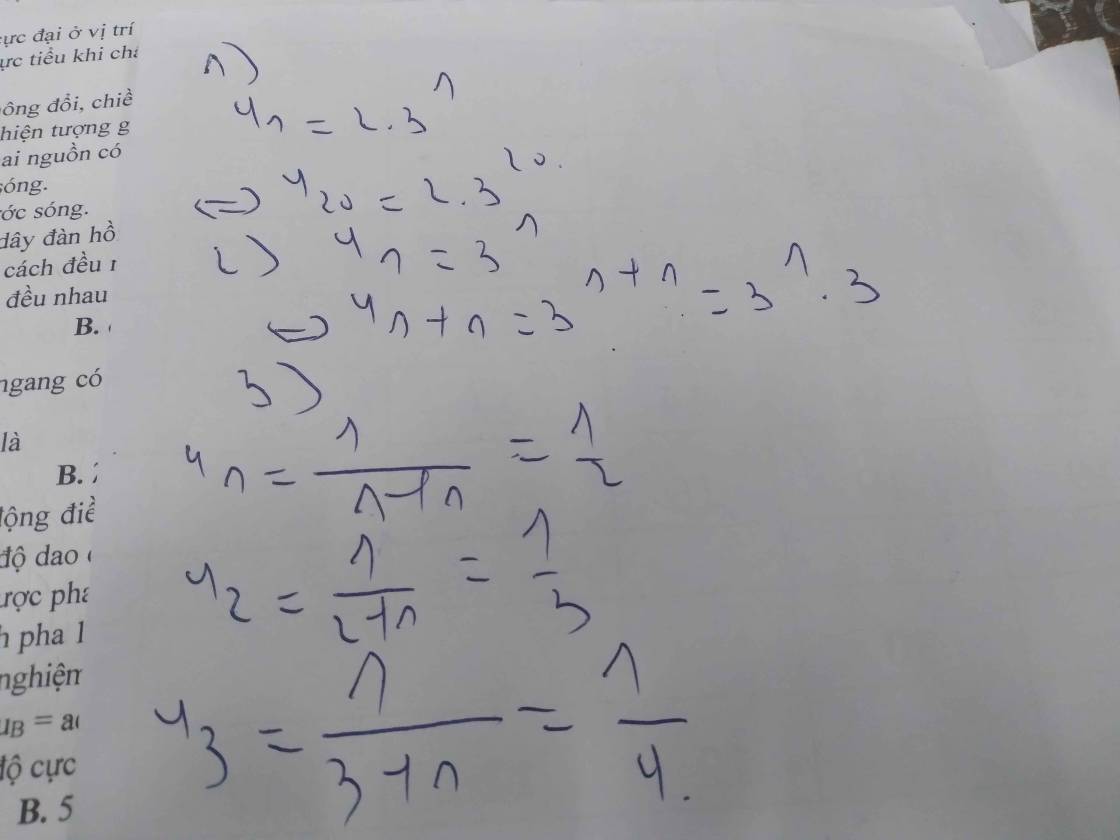Tìm n (n\(\in\)N), biết 2020\(^{\left(n-20\right).\left(n+11\right)}\)=1
Hãy nhập câu hỏi của bạn vào đây, nếu là tài khoản VIP, bạn sẽ được ưu tiên trả lời.


Đặt \(v_n=u_n^2\Rightarrow\left\{{}\begin{matrix}v_1=2851\\v_{n+1}=v_n+n\end{matrix}\right.\)
\(\Rightarrow\left\{{}\begin{matrix}v_1=2851\\v_{n+1}-\dfrac{1}{2}\left(n+1\right)^2+\dfrac{1}{2}\left(n+1\right)=v_n-\dfrac{1}{2}n^2+\dfrac{1}{2}n\end{matrix}\right.\)
Đặt \(v_n-\dfrac{1}{2}n^2+\dfrac{1}{2}n=x_n\Rightarrow\left\{{}\begin{matrix}x_1=2851\\x_{n+1}=x_n=...=x_1=2851\end{matrix}\right.\)
\(\Rightarrow v_n=\dfrac{1}{2}n^2-\dfrac{1}{2}n+2851\)
\(\Rightarrow u_n=\sqrt{\dfrac{1}{2}n^2-\dfrac{1}{2}n+2851}\Rightarrow u_{2020}=1429\)

(\(x\) + 2)n+1 = ( \(x\) + 2)n+11
(\(x+2\))n+1 - ( \(x\) + 2)n+11 = 0
(\(x\) + 2)n+1.( 1 + (\(x\) + 2)10) = 0
(\(x\) + 2)10 + 1 > 0 ∀ \(x\)
=> (\(x\) + 2)n+1 = 0 ⇒ \(x\) + 2 = 0 ⇒ \(x\) = -2
vậy \(x\) = -2

\(\left(x+2\right)^{n+1}=\left(x+2\right)^{n+11}\)
\(\Leftrightarrow\left(x+2\right)^{n+1}-\left(x+2\right)^{n+11}=0\)
\(\Leftrightarrow\left(x+2\right)^{n+1}-\left(x+2\right)^{n+1}\cdot\left(x+2\right)^{10}=0\)
\(\Leftrightarrow\left(x+2\right)^{n+1}\left[1-\left(x+2\right)^{10}\right]=0\)
\(\Leftrightarrow\orbr{\begin{cases}\left(x+2\right)^{n+1}=0\\1-\left(x+2\right)^{10}=0\end{cases}}\)
\(\Leftrightarrow\orbr{\begin{cases}x+2=0\\x+2\in\left\{\pm1\right\}\end{cases}}\)
\(\Leftrightarrow\orbr{\begin{cases}x=-2\\x\in\left\{-1;-3\right\}\end{cases}}\)
Vậy....
=> (x+2)n+11:(x+2)n+1=1
<=> (x+2)10=1
th1:x+2=1
<=>x=-1
th2:x+2=-1
<=>x=-3
vậy x=-1 hoặc x=-3

b) 3x - 6 - (8x + 4) - (10x + 15) = 50
=> 3x - 6 - 8x - 4 - 10x - 15 = 50
=> (3x - 8x - 10x) = 6+ 4 + 15 + 50
=> -15x = 75 => x = 75 : (-15) = -5
c) => 2x - 3 = 2 - x hoặc 2x - 3 = - (2 - x) (Vì 2 số có giá trị tuyệt đối bằng nhau thì chings bằng nhau hoặc đối nhau)
+) nếu 2x - 3 = 2 - x => 2x+ x = 2 + 3 => 3x = 5 => x = 5/3
+) nếu 2x - 3 = -(2 - x) => 2x - 3 = -2 + x => 2x - x = -2 + 3 => x = 1
Vậy x = 5/3 hoặc x = 1
a) (n-1)n+11-(n-1)n=0
(n-1)n(n-1)11-(n-1)n=0
(n-1)n[(n-1)11-1]=0
(n-1)n=0 hoặc (n-1)11-1=0
n-1=0 hoặc (n-1)11 =1
n=1 hoặc n-1 =1
n=1 hoặc n =2

a) Vế trái \(=\dfrac{1.3.5...39}{21.22.23...40}=\dfrac{1.3.5.7...21.23...39}{21.22.23....40}=\dfrac{1.3.5.7...19}{22.24.26...40}\)
\(=\dfrac{1.3.5.7....19}{2.11.2.12.2.13.2.14.2.15.2.16.2.17.2.18.2.19.2.20}\\ =\dfrac{1.3.5.7.9.....19}{\left(1.3.5.7.9...19\right).2^{20}}=\dfrac{1}{2^{20}}\left(đpcm\right)\)
b) Vế trái
\(=\dfrac{1.3.5...\left(2n-1\right)}{\left(n+1\right).\left(n+2\right).\left(n+3\right)...2n}\\ =\dfrac{1.2.3.4.5.6...\left(2n-1\right).2n}{2.4.6...2n.\left(n+1\right)\left(n+2\right)...2n}\\ =\dfrac{1.2.3.4...\left(2n-1\right).2n}{2^n.1.2.3.4...n.\left(n+1\right)\left(n+2\right)...2n}\\ =\dfrac{1}{2^n}.\\ \left(đpcm\right)\)

(n-1)n+11-(n-1)n=0
=>(n-1)n.[(n-1)11-1]=0
=>(n-1)n=0=>n-1=0=>n=1
hoặc (n-1)11-1=0=>(n-1)11=1=>n-1=1=>n=2
vậy n=1;2
(n - 1)n + 11 - (n - 1)n = 0
=> (n - 1)n + 11 = (n - 1)n
=> n - 1 = 0 và n - 1 = 1 (vì 1 mũ bao nhiêu cũng bằng 1)
=> n = 0 + 1 = 1 và n = 1 + 1 = 2
lúc nãy làm thiếu

\(2020^{\left(n-20\right).\left(n+11\right)}=1\)
\(\Leftrightarrow\left(n-20\right)\left(n+11\right)=0\)
\(\Leftrightarrow\orbr{\begin{cases}n-20=0\\n+11=0\end{cases}\Leftrightarrow\orbr{\begin{cases}n=20\\n=-11\left(loai\right)\end{cases}}}\)
Vây n=20